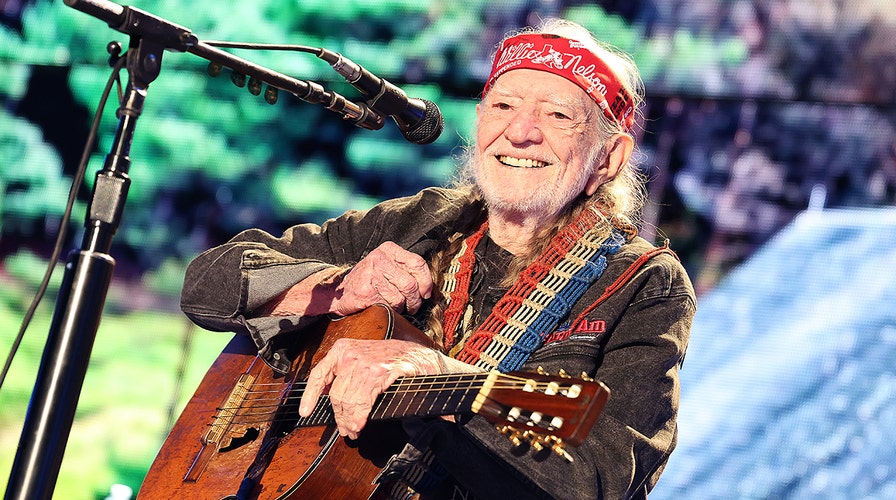At 92 years young, Texas legend Willie Nelson continues to defy expectations with electrifying performances, heartfelt storytelling and a new chapter of musical creativity that spans seven decades—click the link to read more.
Willie Nelson at 92: A Lifetime of Music, Rebellion, and Grace
Willie Nelson was born on April 29, 1933, in the small town of Abbott, Texas. Raised by his grandparents during the Great Depression, he learned the values of hard work, community, and faith early in life. But it was music that truly became his calling. With a battered guitar in hand and a head full of lyrics, young Willie started writing songs as a boy, finding solace and purpose in melodies that mirrored the joys and struggles of everyday people.
By his teenage years, he was performing in local bars and dance halls, already developing the distinct style that would later set him apart—smooth, behind-the-beat phrasing and lyrics that went beyond love and loss, digging into philosophy, humor, and politics. After a brief stint as a DJ and Bible salesman, he moved to Nashville in the 1960s to pursue a career as a songwriter. There, he penned timeless hits such as “Crazy” (made famous by Patsy Cline), “Funny How Time Slips Away,” and “Night Life,” quickly gaining respect as one of the most gifted writers in the industry.

Despite his success as a songwriter, Nelson’s own recordings were often overlooked by mainstream radio due to his unpolished voice and unconventional delivery. Nashville’s tightly controlled image didn’t fit the rugged, authentic vibe Willie embodied. Frustrated by the lack of creative freedom, he returned to Texas in the early 1970s, settling in Austin—a city that embraced individuality and rebellion.
That decision marked the beginning of the outlaw country movement, a style of country music that rejected Nashville’s gloss in favor of raw emotion, storytelling, and honesty. Alongside artists like Waylon Jennings and Kris Kristofferson, Willie Nelson released a string of groundbreaking albums, including “Shotgun Willie,” “Phases and Stages,” and “Red Headed Stranger.” These albums not only redefined country music, but also brought Nelson mainstream success and critical acclaim.
Throughout the 1980s and 1990s, Willie remained a prolific artist. He released collaborations with pop and jazz artists, starred in films, wrote books, and became a strong advocate for causes he believed in. One of his most enduring legacies is Farm Aid, a nonprofit concert series he co-founded in 1985 to raise money for struggling family farmers across the United States. He also became a vocal supporter of marijuana legalization, environmental protection, and animal welfare.
But not everything was smooth. In 1990, Nelson found himself in deep trouble with the IRS, facing a debt of over $16 million. His assets were seized, including his beloved ranch. But Willie did what he always did—he turned hardship into art. He released a tongue-in-cheek double album titled “The IRS Tapes: Who’ll Buy My Memories?” and paid off his debts over time, with help from loyal fans and friends.

Even as the years went by, Nelson never slowed down. In his 70s, 80s, and now 90s, he has continued to tour, write, and record. His live shows are legendary not only for their energy but also for their intimacy. He often performs without a setlist, letting the music guide him from one song to the next. His band is made up of family and longtime collaborators, including his sister Bobbie, who played piano alongside him until her passing in 2022.
What keeps Willie going? He’s been asked this countless times. His answer usually involves some combination of family, fans, music, and cannabis. But more than anything, it’s his sense of purpose. He believes in music as a force for good—something that can heal, connect, and inspire. This belief fuels every note he sings and every line he writes.
In recent years, Nelson has embraced new musical challenges. He released a bluegrass album that reimagined his classic songs in a stripped-down, rootsy style. He’s also published memoirs that offer candid insights into his life, his mistakes, his beliefs, and his hopes for the future. Despite being in his 90s, he’s still writing new material, collaborating with young artists, and planning new projects. His creativity shows no signs of fading.
Fans young and old continue to find meaning in his work. For older generations, Willie represents the golden era of country music, when storytelling and emotion mattered more than image. For younger fans, he’s a symbol of artistic independence and rebellion. His music transcends genre, age, and background—uniting people with its honesty and soul.

Willie’s signature guitar, Trigger, has become nearly as legendary as the man himself. Worn, weathered, and covered in signatures, it has been with him through every stage of his journey. Just like Willie, Trigger carries the scars of a life fully lived—and still has songs left to sing.
Today, at 92, Willie Nelson is more than just a country singer. He is a storyteller, an activist, a father, a poet, a rebel, and a survivor. His life is a roadmap for anyone who believes in doing things their own way, staying true to their voice, and never giving up on what matters most.
As long as there are songs to write, stories to tell, and crowds to play to, Willie Nelson will keep going. And the world will keep listening.





